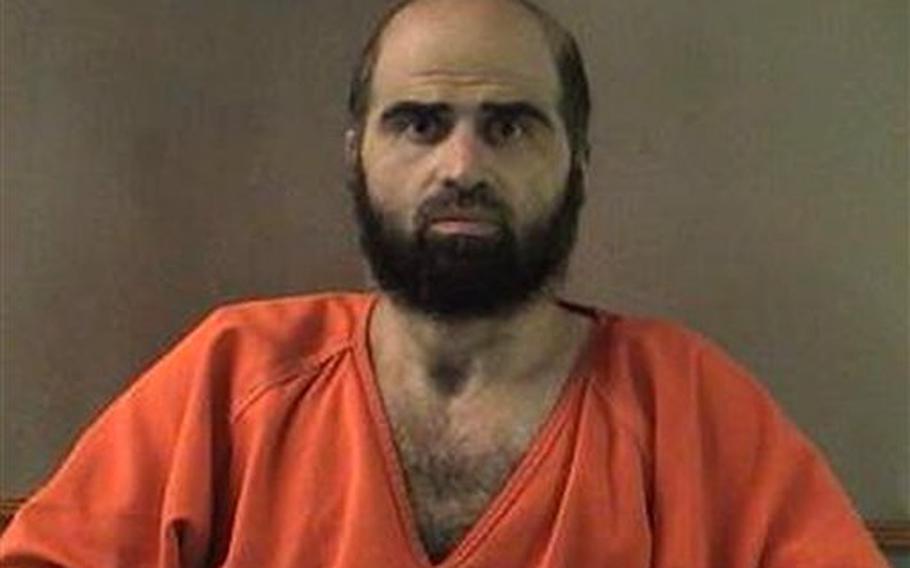
This undated photo provided by the Bell County Sheriff's Department shows Maj. Nidal Hasan, an Army psychiatrist charged in the 2009 Fort Hood shooting rampage. (Bell County Sheriff's Department)
FORT HOOD, Texas — Referring to himself as part of the Mujahedeen, Maj. Nidal Hasan, charged in the shootings at Fort Hood, told a court Tuesday that war has brought much death and destruction, and he found himself “on the wrong side.”
Hasan, who is representing himself, is charged with 13 specifications of premeditated murder and 32 specifications of attempted premeditated murder in the Nov. 5, 2009, shooting at a Fort Hood clinic that left 13 dead and more than 30 wounded.
In an opening statement that lasted only about a minute, Hasan spoke in a voice so soft it became nearly impossible to hear at times.
Hasan told jurors that “the evidence will clearly show that I am the shooter.”
But, he said, “the evidence presented will only show one side.”
Hasan said the Mujahedeen is made up of “imperfect Muslims, trying to establish the perfect religion. I apologize for any mistakes I made in this endeavor.”
Hasan’s opening statement followed a nearly hourlong opening statement from the prosecution that recounted many of the details of the months leading up to the shooting, as well as a second-by-second account of the massacre.
Col. Steve Hendricks, one of the prosecuting attorneys, told the court that evidence will show Hasan planned the attack because he did not want to deploy and because he came to feel “a jihad duty.”
Hasan specifically went after soldiers, going on “a targeted shooting spree of those wearing a uniform,” Hendricks said.
Soldiers go to that clinic for vaccines or to have blood drawn, Hendricks said, but the main reason they go is to have their medical records reviewed before deployment.
The only person in civilian clothes who was killed during the attack was Michael Cahill, a retired soldier who charged Hasan with a chair in an attempt to stop the attack, Hendricks said. He also spared several civilians and soldiers wearing civilian clothes, Hendricks said.
Three witnesses, all associated with Guns Galore in Killeen, Texas, testified that Hasan purchased an FN-57 at the store in 2009, along with green and red laser sights. He also regularly purchased large quantities of ammunition for the weapon, the witnesses said.
When Hasan came in to buy the gun, he didn’t answer when asked what he would like to use it for, but said he wanted the most technologically advanced weapon on the market, said William Gilbert, who was an Army specialist in the summer and fall of 2009 and liked to hang out at the store.
Fred Brannen, the salesman who sold Hasan the pistol, said Hasan came in nearly every Friday and bought an unusually large amount of ammunition.
“Most people don’t have $200 to $300 to spend on an afternoon shooting session,” Brannen said.
An FBI agent who was part of the evidence response team on the day of the shooting said she was surprised when she searched Hasan’s apartment.
“There wasn’t much furniture,” Tracy Holm said, describing a living room with only “a prayer mat and a shredder” in it.
A former neighbor of Hasan’s, Patricia Villa, said he had given her several items from his home the day before and the morning of the shooting. He also asked her to clean his apartment for him, and gave her $60, she said.
Pat Sonti, who said he met Hasan at the Killeen Islamic Center, said he remembers seeing Hasan at the center the for morning prayer on Nov. 5, 2009.
Sonti believed he had been chosen to lead the call for prayer that morning, but Hasan took the microphone and did it instead. After the imam led the prayer, Hasan “bid goodbye, and told the congregation that he was going home,” Sonti said.
Because he is representing himself, Hasan will be be the one cross examining those who say he attacked them.
When proceedings began, the judge, Col. Tara Osborn, told those sitting in the gallery that some of the evidence they would hear would be graphic, but that she would not allow anyone to talk, shake their heads in approval or disapproval or participate in any other type of outburst.
“This court has the responsibility to ensure that this trial is conducted with the proper decorum,” she said.
hlad.jennifer@stripes.com Twitter: @jhlad